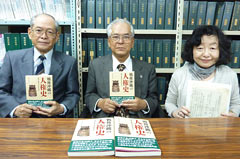History book on human rights in Okinawa published

In Naha on April 6, chief editor, Toshiaki Nakahara (left) and the editorial staff promoted the book, saying, "The book summarizes the history of human rights in Okinawa."
April 9, 2012 Ryukyu Shimpo
To mark the 50th anniversary of its establishment, the Okinawa Human Rights Association, which was established when Okinawa was under U.S. military administration and has since been involved in the protection of human rights for the people of Okinawa, has published the History book of human rights in Okinawa after World War II through the Kobunken publishing company. The book will be sold at bookstores in Okinawa from April 13 and covers citizens’ human rights movements in set periods. Editorial staff recommended the book, saying, “It summarizes the history of human rights in Okinawa. We would like people ranging from students to senior citizens to use it as a handbook for human rights.” The price is 2415 yen including tax.
The book describes Okinawa after World War II as a place where there was no constitution because neither the Japanese Constitution nor the American Constitution were applied at that time. The Association, which was formed as a safe haven for people whose human rights were abused, handled many cases. They included cases related to matters such as U.S. military forces’ thought investigations, travel bans and disenfranchisement in Okinawa. The Association received notification of 130 cases in the first year of its establishment and the book describes how the Association scrambled to appeal to the relevant authorities.
The book also extensively covers cases related to issues of deployment of the Self-Defense Forces in Okinawa, women’s rights regarding inheritance of a spirit tablet and the issue of stateless children, which came to symbolize the 1980s. The book includes not only historical facts but also excellent columns written by editorial staff. These included the incident in which the U.S. military administration dismissed then Naha mayor Kamejiro Senaga, and the Takae lawsuit, in which a decision was made in the lower court this March. Chief editor of the book, Toshiaki Nakahara, who is the president of the Okinawa Christian University, said, “The book covers the history of human rights in Okinawa, and really I would like many people in Okinawa to read it.”
(English translation by T&CT, Mark Ealey)
Previous Article:Okinawa rail photographed eating its lunch
Next Article:Students complete a course in Okinawan traditional dress-fitting and hair-arrangement
[Similar Articles]
- Fight for human rights in Okinawa
- Book on the crimes of U.S. Occupation Forces against Okinawan people is published by a former OPG official
- Okinawan Genealogical Society of Hawaii publishes a book of stories of Okinawan Americans who remember the attack on Pearl Harbor
- Book on Ginowan eisa published
- NGO Human Rights Now criticizes Japanese government for blocking protesters in Henoko and Takae
 Webcam(Kokusai Street)
Webcam(Kokusai Street)


